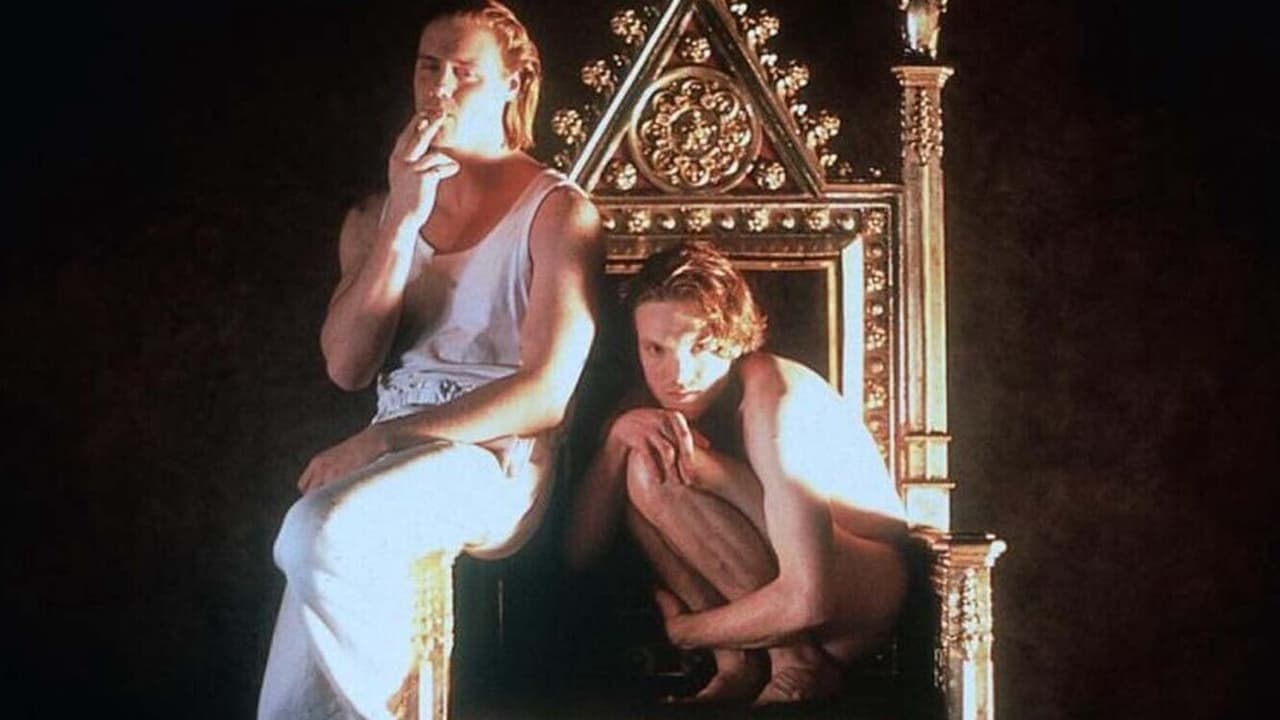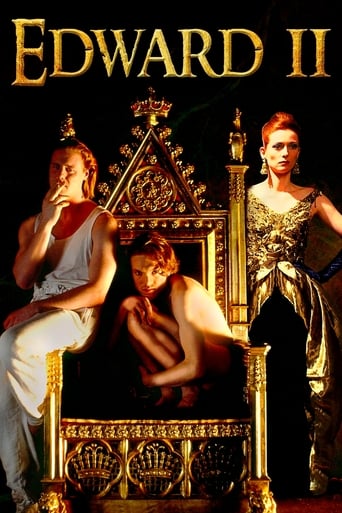

Save your money for something good and enjoyable
... View MoreAlthough it has its amusing moments, in eneral the plot does not convince.
... View MoreI think this is a new genre that they're all sort of working their way through it and haven't got all the kinks worked out yet but it's a genre that works for me.
... View MoreThis movie feels like it was made purely to piss off people who want good shows
... View MoreThis movie is based upon a play written by Christopher Marlowe. Marlowe lived in the 16th century (1500's) while the events in the play took place in the 14th Century (1300's), thus there is approximately a 200 year difference between the events the play depicts and its writing. This means that Marlowe could have been making a political comment at the time, but using a king from the past so as not to make it too controversial.The play is about the King of England, Edward Plantagenat II, who ascends the throne after the death of his father Edward I. Edward is a homosexual and within the first couple of scenes, seeks and finds a lover in a peasant named Galveston. Edward uses his kingly powers to raise this peasant to nobility and proclaims him chancellor of the realm, Duke of Cornwell, and King of the Isle of Mann. Edward does this because he loves this man, but he does not understand tradition. He, as a king, has no right to bestow such titles on peasants. This angers the nobility, especially the general.His wife, on the other hand, is frustrated because he find no interest in her. She would rather see him rid of Galveston and return to her, but when Galveston is exiled through pressure from the nobles, she discovers that he is even less interested in her and instead pines for the return of Galveston. Thus throughout the play we discover that his wife, Isabella, becomes ever more alienated from her husband and becomes closer to the general, who becomes Regent of England until her child, Edward III, becomes old enough to take the throne.Marlowe lived in a rather turbulent time in English history, namely during the reformation when England was being pulled between Protestantism and Catholicism. King Henry had broken away from Rome and had set himself up as the head of the church. There were going to be repercussions to this action and I think this is possibly what the play represents. Edward makes a peasant his second in command, and the repercussions was that he alienated himself from his nobles, thrust the country into civil war, and in the end he was executed. In real history, Edward was removed from the throne by an act of parliament and a regent set in place to rule until Edward III was old enough to rule. The turmoil that resulted from the events with Galvaston reflect what might happen with the break from the church, though there is little that I can comfortably say without knowing too much about the dates of the play.The film itself was done in a very abstract style. The clothing was modern day, but the scenes were very abstract. The film closed with Edward III standing on top of a cage in which queen Isabella and the general were frozen. Edward III did finally master Isabella and the regent when he burst into their room and slew them. After that he turned his attention to France.The question in my mind, is the film pro or anti-homosexual. There are a lot of men kissing men in the film, and in my mind the film probably is designed to be pro-homosexual. Obviously considering the topic. The play, I don't think so. I think the play possibly serves a different purpose. I don't think homosexuality was the issue then that it is today. The film confronts us with it and tries to show us that there is nothing wrong with it, yet the play flares out about how unnatural it is. Maybe the director is trying to confront us with the images for shock value for the play does not come out for or against. The king is executed along with Galveston who is also exiled and spat upon during the play.I thought the play was brilliant, but generally literature from that time was of a very high quality. The movie annoyed me with the homosexual images but I was able to look past that to the play itself in which a very powerful and violent story was unfolding.
... View More"Edward II" (1991) by Derek Jarman is a variation on Christopher Marlowe's 16th-century play "The Troublesome Reign of Edward II" which tells the story of England openly gay King Edward, and his relationship with Piers Gaveston that bitterly angers his queen, Isabella of France, "The French She-Wolf", and eventually leads to his fall - he will lose his Kingdom and his life. If I had not known that Jarman was a painter and a Caravaggio admirer, I would've guessed immediately after first 5 minutes or so. His usage of light and shadows was amazing. His lack of historical settings and staging the film among the bare walls as well as including many anachronisms, such as modern clothes and cigarette smoking gave the old story timeless feel. Tilda Swinton as a woman scorned never looked so ethereal and breathtakingly beautiful. For her acting, she won the best Actress award at the Venice Film Festival in 1991. "Edward II" is a gripping film that is in the same league as Julie Taymor's stunning adaptation of Shakespeare's "Titus" but it is certainly not for everyone.7.5/10
... View MoreI've watched this movie at least half a dozen times while adapting and directing my own stage version of this brilliant, but somewhat long-winded and un-focused Marlowe play. That said (and my bias revealed), I have to admit that I don't care much for this film- though I do admit it has some strengths- namely the visual elements, which reflect the director's background as a painter (he knows how to frame and arrange a shot, and he picks beautiful lines and colors to illustrate his story). Tilda Swenton's performance is amazing (has she ever been bad?) and provides the emotional thrust of the movie- we believe she wants Edward so badly that she's willing to kill him so no one else will have him. Unfortuneately, Gaveston just comes off as a twisted psychotic and Waddington's performance as Edward renders the king weaker than Marlowe writes him, and yet devoid of the inner vulnerability that ultimately makes the King sympathetic- I never once believe they really love each other, let alone madly enough to topple a whole nation. But plot and character don't seem to be a priority of the film as much as statements about gay rights and strange, arty and really heavy-handed intrusions. Too bad, really. There's so much to be dug out of the script- and some of those gems DO appear in this film... but so many seem not only undiscovered, but lost in a lot of camp, confusion, violence and raw, un-erotic sex. Don't get me wrong- the film is worth seeing... I just hope that one day, I get to make a new interpretation.
... View MoreThe story of Edward II is a story of obsession, of a man whose one-track mind causes him to lose his kingdom, his lover and his life. Marlowe's play (probably his most dramatic and certainly his least poetic) gives lots of scope for developing the problems raised by Edward's infatuation for the unscrupulous and self-seeking Gaveston: his inattention to affairs of state, his irresponsible spending, his granting of important positions to Gaveston who has no interest in actually fulfilling his duties and Gaveston's general contempt for church, nobility and everyone else.Unfortunately director Jarman has arranged this production in such a way as to make us see Edward's story through Edward's eyes rather than those of an outside observer. The sets are mostly pueblo-style interiors, giving the impression that this is a middle-class household not the palace of a king. There are no extras, and the scenes are bare of people, again reinforcing the idea that this is a private rather than a public story. The nobles are treated as tourists who are out of place in the life of the king. Our attention is focussed constantly on the intimate relations between individuals: Edward and Gaveston, Edward and Isobel, Isobel and Mortimer.Edward, whose whole life was dominated by his obsessive love for Gaveston (just count how many times he says "my Gaveston" in the play) saw his world in just this way: everything anyone did was measured against how it affected his romance, and everything he did was to further it. When Isobel abandons him, she loses her humanity and becomes in his eyes a grotesque vampire. Indeed one wonders how much of what we see as reality in the film is Edward's fantasies and imaginings as he becomes increasingly deranged.An intriguing approach, perhaps, but the problem is that Edward's one-track mind makes for a one-track monochromatic presentation, and quite frankly it becomes so superficial as to be tedious after a bit. Without the depth provided by an objective viewpoint we lose interest.Scenes of unnamed naked men making love or playing rugby without a ball must have been put in for the titillation of gay viewers. They added nothing to the story. On the other hand the love between Edward and Gaveston was sincerely and persuasively played, and a good thing too, because that's about all you get here.Waddington's performance is splendid and gives a lot of life to what might otherwise have been a total yawn; it's worth the trouble of watching this just to see him. Tilda Swinton's performance is overrated; she delivers her best monologue as slowly and tonelessly as possible and it doesn't take long to start wondering when she's going to show some emotion.
... View More